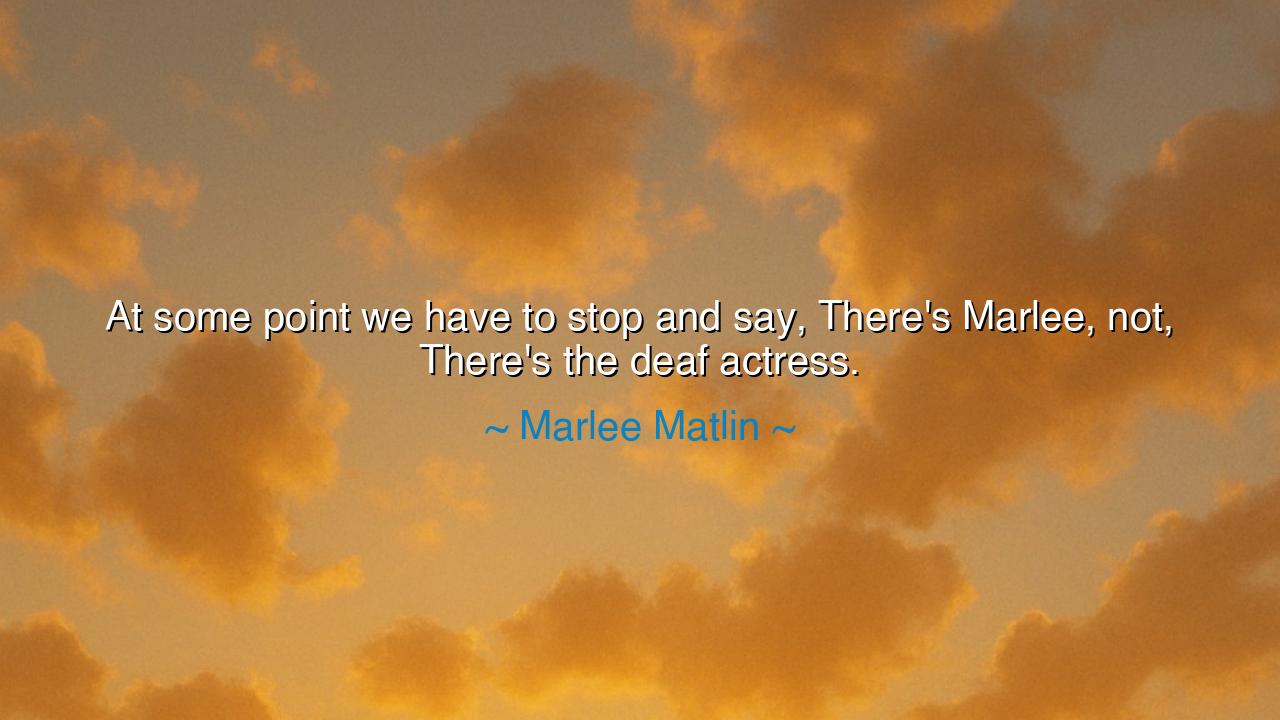
At some point we have to stop and say, There's Marlee, not






The words of Marlee Matlin—“At some point we have to stop and say, There’s Marlee, not, There’s the deaf actress.”—shine like a flame against the darkness of prejudice. They speak of the eternal struggle of identity, of the yearning to be seen not through the narrow lens of a label, but through the vast and radiant expanse of one’s humanity. In this single sentence, Matlin, both artist and pioneer, calls upon all hearts to see beyond limitation, to recognize that a person’s essence cannot be contained by their condition. Her words are not only a defense of dignity—they are a declaration of freedom.
To understand the origin of this quote, one must know the story of Marlee Matlin herself. Born deaf in infancy, she rose to become the first—and still only—deaf performer to win the Academy Award for Best Actress, for her role in Children of a Lesser God (1986). Yet even after such triumph, the world often spoke of her not as “Marlee Matlin, the actress,” but as “the deaf actress.” Her identity, her craft, her achievement—all were framed by her difference. From this experience was born her cry for equality, not the kind granted by pity, but the kind that demands recognition of full personhood. She sought to remind the world that true inclusion begins when difference no longer defines one’s worth.
In her words, there is a subtle but powerful truth: labels, even when well-meant, can become chains. To name someone by what separates them rather than what unites them is to diminish their spirit. In ancient times, philosophers spoke of the “universal soul” that resides in all living beings, beyond form or circumstance. Whether a person walks with sight or without, hears with ears or with hands, the soul within is unbroken. Matlin’s declaration calls us to return to this ancient wisdom—to see each being not as a category, but as a creation, radiant and whole.
History is rich with others who have borne similar burdens of misunderstanding. Consider the story of Helen Keller, blind and deaf from early childhood, who was long viewed as an object of pity until her brilliance shattered all expectation. She became an author, philosopher, and advocate for justice, proving that limitations of the body are no barrier to the freedom of the mind. Yet even she was often spoken of in terms of her disabilities rather than her intellect. Like Matlin, Keller sought not to erase her difference, but to transcend it—to show that difference is not defect, and that one’s humanity cannot be reduced to circumstance.
The meaning of Matlin’s words reaches far beyond her own story. It is a call to all who have ever been reduced to a single trait, a single struggle, a single label. It is a call to society to look deeper—to see the artist beyond the deafness, the leader beyond the gender, the human beyond the color. Equality does not mean sameness; it means recognition of worth beyond measure, the understanding that every soul is a vast constellation, not a single star. To honor that truth is to walk in the path of wisdom and compassion.
And yet, Matlin’s words also hold a mirror to each of us. For how often do we, even unconsciously, name others by what distinguishes them? “The foreigner,” “the disabled,” “the poor,” “the other.” Each time we do, we build invisible walls between ourselves and our kin. To live her teaching, we must learn to speak without separating, to see without categorizing, to listen without judgment. Only then can we approach the divine ideal of seeing people not as labels, but as living, breathing expressions of the same human soul.
The lesson, therefore, is simple and sacred: honor individuality, but worship humanity. Let your eyes look past the surface, and your heart hear what the world cannot. When you meet another, see not the label others have placed upon them, but the light they carry within. For every person, no matter how defined by circumstance, carries a story, a dream, and a fire that deserves to be seen in its fullness.
So remember these words as a commandment for all ages: do not say, “There’s the deaf actress,” or “There’s the blind writer,” or “There’s the different one.” Say instead, “There’s a soul, alive, complete, and beautiful.” For when the world learns to see thus, the walls of prejudice shall crumble, and what remains will be what was always there—the pure, unbroken light of human equality and grace.






AAdministratorAdministrator
Welcome, honored guests. Please leave a comment, we will respond soon